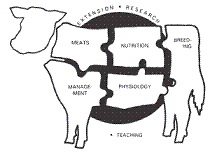Animal Science, Department of

Nebraska Beef Cattle Reports
Date of this Version
2024
Citation
2024 Nebraska Beef Cattle Report
UNL Beef, Institute of Agriculture and Natural Resources, University of Nebraska-Lincoln
Abstract
Some amino acids are known to be essential to cattle and effect protein availability to the animal, especially during gestation when nutrient requirements are higher. Methionine is found to be one of the most limiting in low quality forage diets. Two 3-yr studies were performed to evaluate the impact of methionine supplementation during late gestation on intake, body weight, average daily gain, and subsequent calf performance in primiparous and multiparous females. In exp 1, 120 artificially inseminated pregnancy heifers were placed in a Calan gate feeding system (n=40/yr) and assigned 1 of 3 treatments during late gestation and fed ad libitum grass hay with either: no supllement, 2 lbs. distillers based supplement with 1 oz of rumen protected methionine. In exp 2, multiparous cows on upland winter range were fed 1 of 5 treatments; no supplement, ad libitum meadow hay, 1 lb. of a distiller's based cube, 2 lb. of a distiller's based cube, or 2 lb. of a distiller's based cube plus 1 oz of a rumen protected methionine. Body weight, body condition score, reproductive responses, and subequent calf performance were recorded in both studies. No differences were observed in calving performance or progeny carcass characteristics in either experiment in response to methionine supplementation, so it may not be a necessary supplementation strategy.
Included in
Large or Food Animal and Equine Medicine Commons, Meat Science Commons, Veterinary Preventive Medicine, Epidemiology, and Public Health Commons

